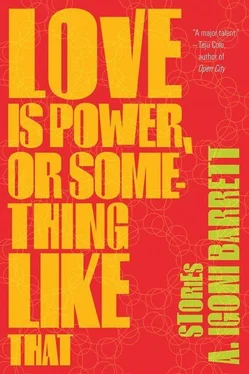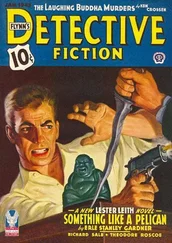“Three hundred,” Méneia said, after a quick calculation.
“With fish or meat?”
“Meat.”
“Fish is cheaper.”
“But we used fish for the last two pots of soup!”
Her older brother made no reply, and Méneia, with a sigh, said, “Okay, fish. Two hundred will be enough. Or what do you think?”
“Yes,” Dimié Abrakasa said. “I have—” he turned out his pockets, producing clumps of paper and wisps of lint and some naira notes, “—one hundred and six, seven. . I have one hundred and seventy naira. What of you?”
“I have only ten naira, Dimié.”
“Bring it. And you, Benaebi?”
“I’m hungry,” Benaebi mumbled at the TV screen.
Méneia swung her head to look at him. “Benaebi!” she snapped, “remove that hand from your mouth before I slap you! Boo-boo-boo baby! Do you have any money?”
“I have fifty naira but I’m not giving you!”
“I’ve heard. Where is it?”
“I said I’m not—”
“Will you shut up? Where’s the money?”
“I gave it to Mma this morning.”
All eyes turned to the bed. Méneia broke the silence. “H’m,” she sniffed, “that one is gone. What should we do, Dimié?”
“We have one-eighty,” Dimié Abrakasa said. He counted the notes, folded them into a wad, and stuck it in his right hip pocket. “Let me see—”
His words were cut off by a sudden, cataclysmal darkness. A power cut.
“Aw, NEPA!” Benaebi exclaimed, slapping his thigh. “Dog shit!”
“Shut up,” his sister said, “they’ll bring it back soon.” Then she added: “By God’s grace.”
Dimié Abrakasa edged round the sound of their voices. The subterranean dark, the stench of degraded alcohol, the whispering heat, had turned the room unbearable for him. He reached the door, pulled it open, emerged into the corridor. When he turned to shut the door, he met his mother’s gaze. She raised herself on one elbow, combed back her tousled hair with her fingers, and said, “Don’t even think of coming back to this house without my medicine.”
.4 .
Dimié Abrakasa stepped into the harsh light of midafternoon. On the horizon, he saw a mass of bruise-dark clouds bearing down on the sun. The air was heavy, there was no wind. Rain was approaching. Dimié Abrakasa considered shortcutting through the back streets, but he remembered the money in his pocket, so headed for the open road.
The 1.3 kilometer Ernest Ikoli Road, started in September 1970 and finished nine months later, was for many years extolled — on account of its wideness and its drainage system, its gardened roundabouts and traffic lights and cat’s-eyes lane markers — as the model Nigerian city road, the road of the bright future. Once charcoal-black, the road was now an ash-gray stream that threw off sparks where the metal of embedded bolts and bottle tops caught the sunlight. Potholes strewed the asphalt, and the concrete sidewalks were shot with cracks. The roadside drains were silted over in some places, and trash choked in others. The revving engines and horn blares of commuters, the clang-and-bang of artisans, the roar of a populace world-famous as a loudmouthed lot, beat the air. Theme music of city life.
After he passed Number II Sand Field and crossed the road to avoid an approaching pushcart piled high with yams, Dimié Abrakasa felt the urge to urinate. He stopped, looked around, moved forward a few steps, reached the mouth of the alley he’d spotted, and turned into it. The alley was in shadow. Relief from the sun’s glare heightened the pressure on his bladder, and he picked his way across the alley, holding his breath. The alley floor was dotted with shit mounds; the air stank of old urine. The windows of the story buildings that formed the sides of the alley were boarded up, and paint flakes curled off the lichened walls. A group of boys was gathered at the alley end.
Dimié Abrakasa halted, opened his fly, and ignoring the faded letters on the wall in front of him that spelled,
DO NOT UNIRATE OVERHERE ANYMORE
BY ORDER! THE LANDLORD
he splashed the wall. He arched his back and sighed in release, then shifted his foot to avoid the foaming stream. A thrill of excitement entered the boys’ voices. As he squeezed out the last drops, the boys raised a cheer — a shriek of agony rent the air. Startled, he jumped, and his fly-zipper snagged his flesh. He yelped with pain, and sucked in his breath. Then, with careful fingers, he freed himself from the grip of the zipper teeth.
Giving in to a curiosity so intense he could smell its cat breath, Dimié Abrakasa approached the boys. They made way; they absorbed him into their ranks. As he’d suspected, it was something subhuman they had ganged up on. He’d expected to see a mangy dog, or a goat lying in a pool of blood, but he found he was staring at the cowering form of a rag-draped madwoman. She was crouched on the ground in the center of the circle formed by the boys. Her knees were drawn up to her chest and her hands covered her ears. The skin of her knees was scabrous; her hands were tree-root grimy. Her hair fell on her shoulders in thick, brownish clumps, and it was sprinkled with the confetti of garbage dumps. She reeked of disease.
Dimié Abrakasa turned his gaze to the boys. He counted heads, but when he got to the twelfth, someone moved to a new position, distracting him, and he was too close to the end to bother starting over. Some boys held sticks in their hands, others clutched bricks, and a few had both. He recognized two boys as schoolmates, but every other person was a stranger.
He looked again at the madwoman. She was growling, the sound buzzed at the rim of her teeth, and she rocked on her heels. Her eyes were bloodshot with fear and yet her expression was calm. Her gaze roamed the circle — she swung her head with abrupt, birdlike motions. Dimié Abrakasa averted his gaze, then pushed through the press of bodies till he got next to Baridom, the nearer of the two boys who he knew, and reached out a hand to tap his shoulder.
“Wetin the crazewoman do?” he asked.
Baripo, the second boy, threw Dimié Abrakasa an angry glance. “She craze, ” he said.
At that moment, the madwoman dropped her hands to the ground and pushed herself up. The boys, it seemed, were expecting this move: those holding sticks leaped forward and delivered blows to her head, her back, her buttocks, her legs. Shrieks of pain burst from her throat as she danced around to avoid her attackers, her movements as wild as a leaping flame. Then she sank back to her haunches.
The boys resumed their stargazing. This game was no longer play. They were drunk on high spirits. They fidgeted, impatient with the madwoman’s cowardice. Some of the boys, whoops bursting from their throats, broke the ring to make short, darting runs at the hunched form.
Someone said: “If crazewoman bite you, you go craze.” Nods and murmurs of agreement traveled the circle.
“If dog wey get rabies bite you, you go craze too,” said Baripo.
“Yes o,” Baridom agreed.
“Me, but before I craze, I go burst that dog head,” said the boy who had spoken first.
“You no go fit,” Baripo said. “Dog wey get rabies dey craze.”
“I go fit.”
“You no go fit.”
“I say I go fit!”
“I say you no fit!”
The boy said: “I go fit burst this crazewoman head. Try me!”
Silence. Then the boys’ voices rose in a chorus of cheers and jeers. “You no fit, Ériga — do am, Ériga — burst the crazewoman head!”
Ériga whirled to face Dimié Abrakasa, who was beside him. “You get stone?” Dimié Abrakasa shook his head no. Baripo asked: “You want stone?” Without waiting for a reply, Baridom held out a lump of brick. Dimié Abrakasa, who stood between Ériga and Baridom, reached for the brick, closed his fist around it, hefted it, and then flung it at the madwoman. It struck the side of her head and disintegrated in a shower of dust. She screamed, horribly. It was this explosion of mingled pain and rage — and the superhuman force with which she leaped at her attackers, blood splashing from the gash in her head — that caused the boys to break rank and flee from the alley, their yells trailing in their wake.
Читать дальше

![Сьюзан Кейн - Quiet [The Power of Introverts in a World That Can't Stop Talking]](/books/33084/syuzan-kejn-quiet-the-power-of-introverts-in-a-wo-thumb.webp)










